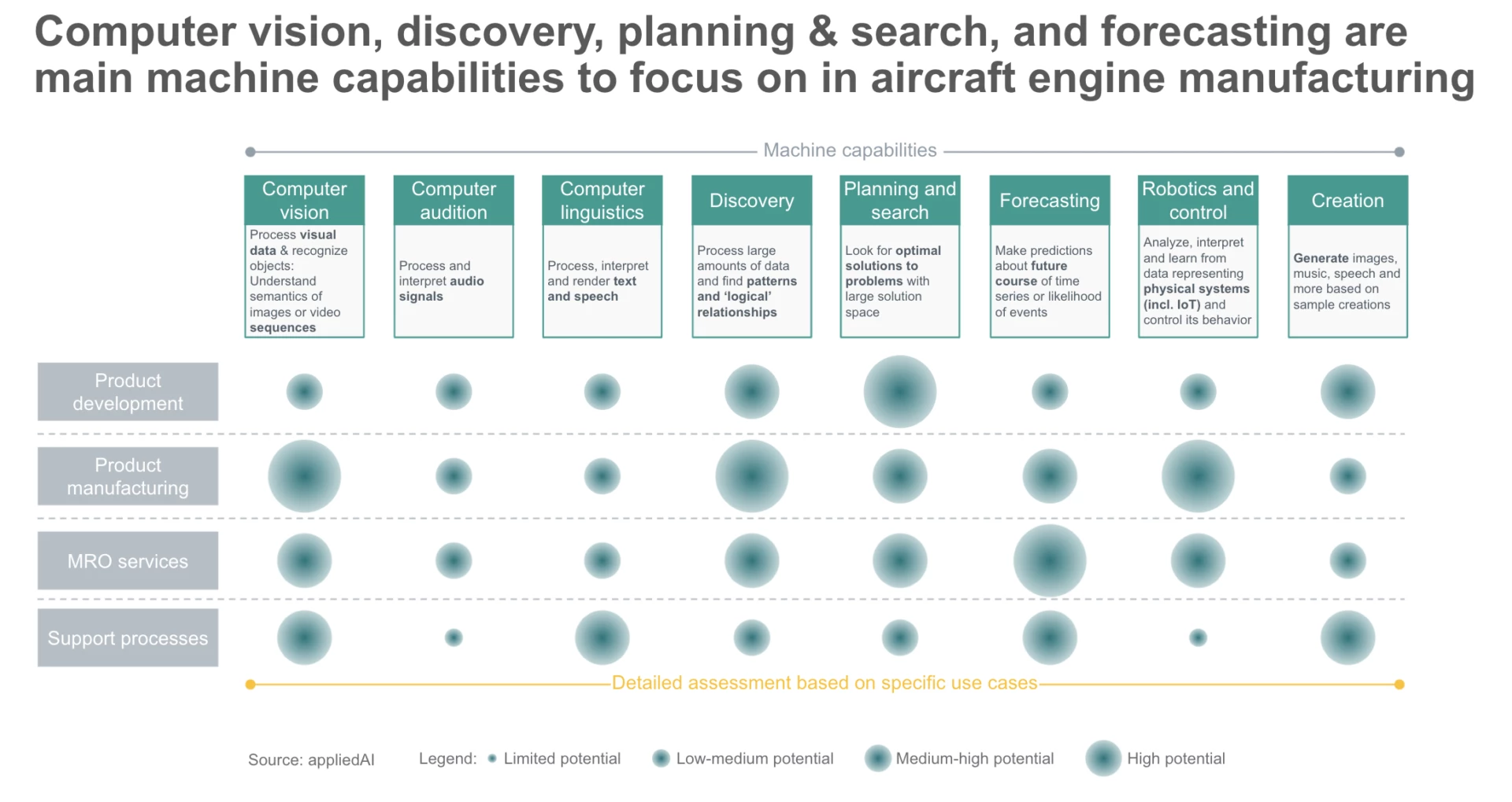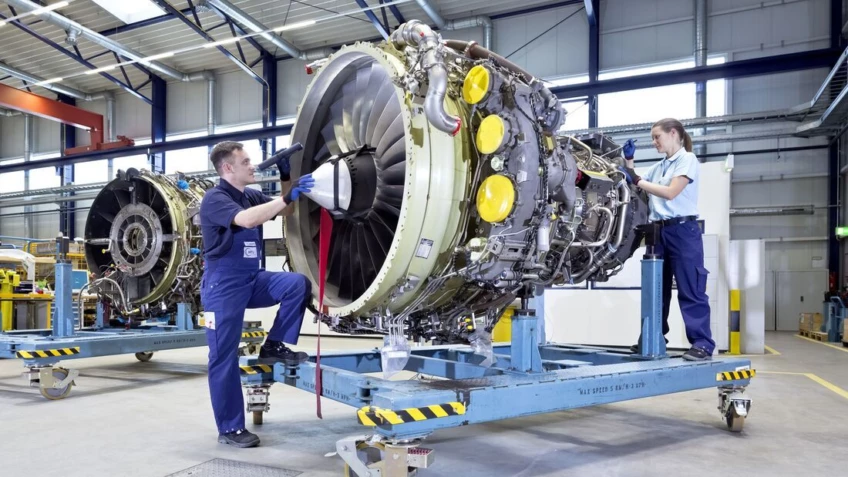MTU Aero Engines: Setting the course for value creation with the help of AI
MTU Aero Engines is a leading provider of aircraft engine subsystems, specializing in the design, development, production, and maintenance of aircraft engine modules in almost all thrust and power classes, from propulsion systems for business aircraft to the most powerful civil engines in the world.
The core products include high-pressure compressors, low-pressure turbines, turbine intercases, and industrial gas turbines. In addition, MTU is a leading provider of customized engine service solutions and carries out approximately 1,000 shop visits per year for over 30 different engine types in the Maintenance, Repair & Overhaul (MRO) business segment.

Background: Building an AI Strategy
MTU employs more than 10,000 people worldwide at 15 locations. In the coming years, MTU will focus its resources on its core business, participate in new engine programs, and expand its service offerings.
As an innovation leader, MTU recognized the enormous potential of AI as a fundamental technology early on, identified numerous AI applications, and implemented independent AI pilots in development, manufacturing, and repair processes.
To fully exploit the value potential of AI, MTU has systematically developed an AI strategy together with appliedAI, Germany's largest initiative for the use of AI technologies, which includes all relevant dimensions: an AI ambition, prioritized AI use cases, the necessary organizational and technical framework conditions, and an implementation roadmap for scaling AI applications.
From Maturity Assessment to Use Case Prioritization
To create a common basis for the later prioritization of action areas, MTU employees from various functional areas and hierarchy levels participated in the systematic appliedAI Maturity Assessment. From the maturity assessment, a data-driven status quo overview was derived, and development potentials were identified. In addition, structured expert interviews were conducted to validate the results.
At the same time, appliedAI and MTU conducted a competition analysis related to AI, as this strongly influences the company-specific AI ambition: an understanding of AI-based competitive advantages, impact on products, processes, and business models, as well as general industry dynamics, is essential for this.
As a result, players in the aerospace industry are massively increasing the use of AI in upstream, equal and downstream stages of the value chain and are applying the technology to varying degrees of intensity in development, manufacturing and maintenance processes. In addition, AI is already established in adjacent high-tech industries to accelerate development simulations, improve component quality control, and increase gas turbine control efficiency.
In order to formulate a coherent target picture for MTU, this market analysis, MTU-internal expert opinions and an appliedAI AI technology potential assessment were consolidated in the AI ambition.
Building on a timeframe of three to four years and clearly defined strategic goals for scaling AI, MTU and appliedAI defined three synergistic application areas that form the focus for identifying AI use cases:
1. product development (virtual engine and test support): Acceleration of development times and utilization of development resources with highest possible efficiency.
2. production (process simulation and automation as well as work preparation, production control and employee support): Increased production efficiency and improved accuracy in predicting the influence of individual production process parameters on product quality
3. maintenance (digital inspection and advanced forecasting): Increased customer proximity and better synchronization of internal planning processes.
Building on the focal points of the AI ambition, MTU and appliedAI conducted three use case workshops. Use cases were first systematically developed and discussed for each business unit. They were then evaluated along the dimensions of value contribution and feasibility, and finally thematically clustered together with department representatives and steering committee members.
Within the individual clusters, particularly promising use cases were finally identified that could serve as potential lighthouse applications. Their underlying hypotheses will be thoroughly tested before Proof of Concepts (PoCs) are developed.
In order to sustainably embed AI in the organization and fully exploit the technology's value potential, MTU and appliedAI have identified a number of key factors in parallel:
- In terms of organizational and governance structures, a hybrid hub-and-spoke approach (with a central AI unit) was identified as particularly promising.
- Extensive role profiles, employee training, and new recruiting strategies were developed to build the required expertise
Together, initial initiatives were prepared to initiate the accompanying cultural change in the company.
In terms of - The foundations for establishing a suitable AI infrastructure and data governance were defined in workshop formats.
From Strategy to Execution
As a result of the AI strategy development project, MTU has established an AI Center of Excellence (AI CoE) as part of their company-wide development and strategy. The goal of the team is to establish a connection between AI use cases and enabling factors (talent, infrastructure, organization, etc.) to sustainably establish the technology within the company.
Therefore, the AI CoE will provide a company-wide overview of the possibilities of AI, advise the business areas of MTU on potential AI use cases, and actively manage the existing portfolio of AI projects to support their implementation and scaling.
The AI Center of Excellence will also develop implementation guidelines for AI project execution, implement training concepts, and strengthen awareness of AI throughout the entire company through targeted communication measures.
In addition to extensive internal activities, the AI CoE will establish a network with relevant external stakeholders and benefit from the wealth of experience of partner companies as an appliedAI journey companion.
Lessons Learned from MTU’s AI Transformation
Three main factors were responsible for the success of the project:
- The project began with an introduction to AI for all participants to establish a common knowledge base. Often in organizations, there are discussions about AI without a shared understanding of the buzzword.
- Stakeholders from all relevant departments and hierarchy levels, including senior management, were involved throughout the project. This ensured that all business areas relevant to AI implementation were covered and a common understanding of the project goal was established.
- MTU extensively utilized the experiences of companies in similar industries and the maturity levels of the appliedAI partner network. This helped MTU address AI-related challenges directly, actively avoid common mistakes, and establish efficient, maturity-specific structures for scaling AI.
In partnership with: MTU Aero Engines
Do you have any questions about the partnership? Talk to us
Unfortunately, we cannot display the form without your consent. We use Hubspot forms that set functional cookies. Please accept functional cookies in the settings to be able to use the contact form. Or write us an email: info@appliedai.de.
